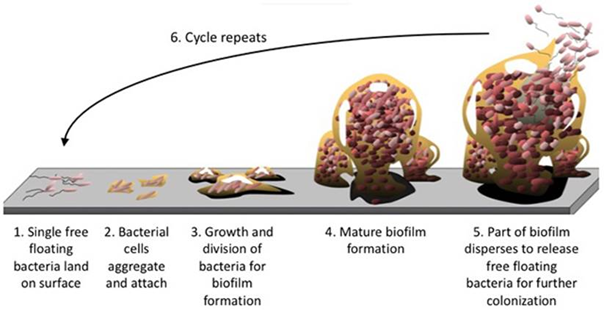For over 20 years, Kane Biotech has focused on creating smarter ways to fight bacteria. Today, Kane is leading the advancement of technologies and products that break up biofilms and destroy bacteria.
But what do we really know about biofilms and why are they so important? Here is a look at the cycle of biofilms and their impact on bacteria.

Bacteria’s “Sticky” House
A simple way to define biofilm is as a glue-like substance excreted by bacteria and fungi to attach to surfaces that “houses”, protects, and allows bacteria to survive and thrive in hostile environments.
According to the NIH’s Human Microbiome Project (HMP) , “The human body contains trillions of microorganisms — outnumbering human cells by 10 to 1. Because of their small size, however, microorganisms make up only about 1 to 3 percent of the body’s mass (in a 200-pound adult, that’s 2 to 6 pounds of bacteria), but play a vital role in human health.”
HMP researchers estimate that over 10,000 microbial species exist in the human body.
Biofilms Predate the T-Rex
Biofilms have been on earth for so long, they even predate dinosaurs. Biofilms have been dated back as far as 3.25 million years ago based upon evidence found in fossils. To put this into perspective, dinosaurs roamed the earth 230 years ago. Interestingly, it would take 65 million years from when dinosaurs went extinct, and the first human would inhabit the earth.
Biofilms have also been discovered in hydrothermal ecosystems such as rocks and hot springs. An article published in Livescience.com states, “biofilms have been found in the 3.2-billion-year-old deep-sea hydrothermal rocks of the Pilbara Craton in Australia. Similar biofilms are found in hydrothermal environments such as hot springs and deep-sea vents.”

How to Examine Biofilm Without a Microscope
It is easy to see biofilm exist in your own body. A quick experiment will involve a handful of candies or chocolate. Simply consume generous portions of the sugary treats of your choice, avoid brushing your teeth, and by the next morning, you will be able to feel a coating or film-like substance on your teeth (some call it “morning mouth fuzz”). That coating or fuzz in your mouth is actually an oral biofilm.
For pets, plaque and tartar are biofilms that cause inflammation, irritation, tooth decay, and loss of teeth. According to the American Veterinary Medical Association (AVMA), 80% of dogs and 70% of cats develop some stage of gum disease by the time they are 3 years old and they can lead to serious complications in a pet’s kidney, heart, and brain.
Why are Biofilms so Important?
Biofilm impaired healing is the largest unresolved problem in wound care. Biofilms make bacteria up to 1,000 times more resistant to antibiotics and antimicrobials. Biofilms are one of the main contributors to antibiotic resistance. The NIH estimates that 80% of all known human infections are associated with biofilms.
Prosthetic Joint Infections (PJI) are difficult to treat because biofilms are one of the most serious and prevalent complications of joint replacement. It is estimated that PJIs cost US hospitals US$1.6B annually with 15% of infections leading to amputation and mortality rates as high as 40% after 6 years.
Recent research has indicated that the persistence of microbial biofilms may be linked to aggravating symptoms associated with common skin conditions including dandruff, seborrheic dermatitis, and acne (which affects 40 to 50 million Americans).
Kane Biotech
With 81 patents and patents pending, Kane Biotech is a leader in biofilm research. Kane has laboratory and clinical evidence that these technologies have the potential to significantly improve the ability to prevent and destroy biofilms.
Kane Biotech has a growing pipeline of technologies based on their ongoing research on biofilm formation and how this process can be disrupted. Kane is committed to developing products to meet the demand for safe and effective anti-biofilm compounds for a variety of industries and applications. Learn more: https://kanebiotech.com/.
